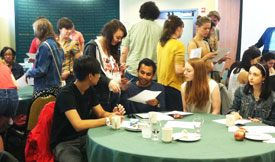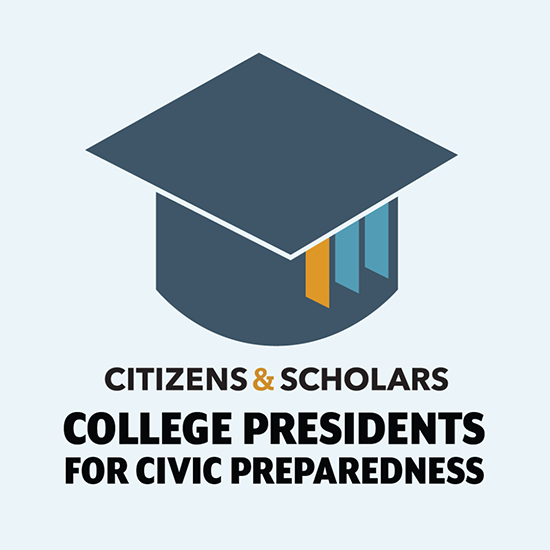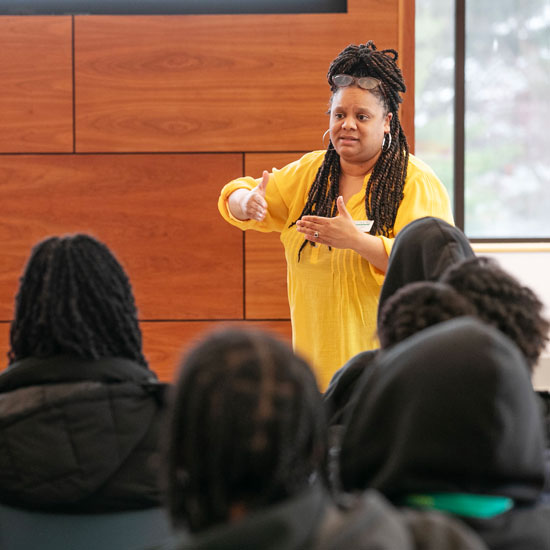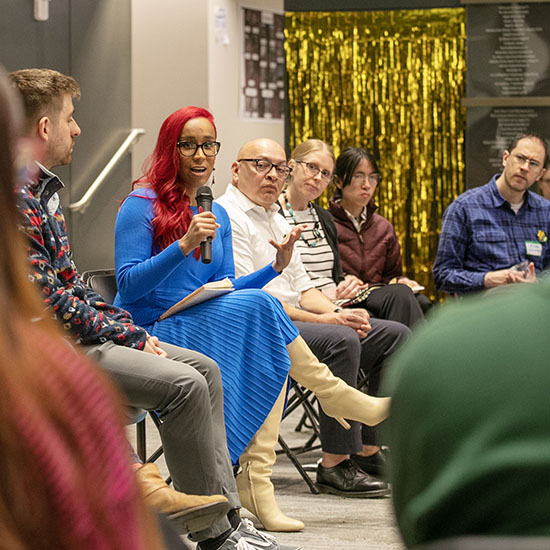Eggs, Alzheimer's, and everything in between

Summer scholars play human bingo at research kickoff
Human bingo? Nearly 70 Skidmore participants in summer research recently played a version invented by program director and government professor Bob Turner.
Instead of covering numbers on a card, the students at the kickoff meeting in late May had to identify their peers according to aspects of their research. Berke Tinaz ’16 was the correct answer to the clue “deconstructing the plant cell wall”; Jaya Borgatta ’16 is on the team “studying the atmospheric fate of fly ash”; Emily Kortright ’15 is the one “analyzing food blogs.” Round 2 clues included succinic acid, the interactive Web program Omeka, frog oocytes, Penium margaritaceum, and alcohol modulation of ligand-gated ion channels (see the glossary below).
Before the bingo, Turner sorted students for seating at large tables where they would ask each other questions about their research. First sort: natural sciences and everyone else. Sort 2: studying living things and everyone else. Final sort: frogs, fish, mice; children and people; math and statistics; and plants, minerals, oceans.
The student researchers, from 19 different academic disciplines and ranging from freshmen to 2014 grads, mingled easily, enjoying the opportunity to meet one another and perhaps gain an edge for the bingo contest. Not present by design were the nearly 40 professors who are collaborating with the students. Turner explains, “This day was about the students getting to know one another, gaining an appreciation for the cool things their peers are doing, and being encouraged to connect with and learn from one another.” (See the complete list of faculty-student teams and topics below.)
An eavesdropper at one table could have discovered that anthropology major John Kolios ’16 is working with archaeologist Heather Hurst ’97 on a collection of artifacts (projectile points, pottery fragments, fire-cracked rock) from a local residential subdivision. Ultimately, Kolios says, they hope to give a public presentation and create a Web site with a timeline of the finds. He adds that he’d like to stay involved with the project for the duration of his Skidmore career.
At another table, American studies major Rebecca Baruc ’15 describes her co-writing of an article with professor Beck Krefting; they’ll submit it in the fall and present in December at the Mark Twain Circle of America and the American Humor Studies Association. She says, “We want to explore how alternative comedic voices are using social media to redefine the production, consumption, and exchange of comedy, which entails interviews with comedians and social media experts, in addition to following the current discourse on social media and comedy.”
The Summer Faculty-Student Research program offers students the chance to spend five, eight, or 10 weeks in full-time research, to gain a hands-on appreciation for scholarly work. Outcomes of the summer collaborations vary—perhaps a foundation for a senior or honors thesis, perhaps co-authorship on published results. In any case, Skidmore alumni who go on to graduate schools consistently report that research experience gives them distinct advantages as scholars.
Glossary
Succinic acid: A colorless, water-soluble crystal used as a chemical intermediate in medicines,
lacquers, and perfume esters.
Omeka.net: Web publishing software that facilitates creation of Web sites to display collections and build digital exhibitions.
Frog oocytes: The unfertilized eggs of frogs commonly used for studies in developmental biology, cell biology, neuroscience, and more.
Penium margaritaceum: A unicellular green alga used as a model for research into the formation, breakdown, and repair of plant cell walls.
Ligand-gated ion channels: Cell-membrane proteins that respond to chemical signals to prevent or allow the entry of certain chemicals into the cell.
The complete summer ’14 project list:
Ten weeks
John Anzalone, French language and literature, with Luke Conley ’14: Visual Resources for Study of Representations of the Great War
Kara Cetto Bales, chemistry, with William Miller ’15: Synthetic investigation and application of a substituted 4, 6-dimethyl-3-cyclohexene compound
Kara Cetto Bales, chemistry, with Lauren Soong ’16: Synthetic Strategies and their Application in the Organic Lab
Rebecca Brooke Bays, psychology, with Jennifer Wicks ’14: An Investigation of Belief in Imagined Childhood Events
David Domozych, biology, with Berke Tinaz ’16: Deconstructing the Plant Cell Wall: In vivo development of selective cell perturbations
Mike Eckmann, computer science, with Yang Yu ’16: Toward detection and recognition of human speakers in meetings
Margaret Estapa, geosciences, with Melanie Feen ’16: Calibrating a new method for measuring ocean carbon fluxes in the presence of high-silicate phytoplankton blooms
Kim Frederick, chemistry, with Sibin Wang ’16: Development of a Microfluidic Assay for Analysis of D-lactate in Urine
Kim Frederick, chemistry, with Sarah Markiewicz ’16: Development of an Automated, Portable Device for Water Pollution Monitoring
Kim Frederick, chemistry, with Meti Debela ’16: Development of a Microfluidic Diagnostic Device for Malaria
Kim Frederick, chemistry, with Julie Bryant ’16: Prototyping of a Lab on a CD Player for Portable Chemical Analysis
Robert Hallock, neuroscience, with Mitch Spring ’15: The Effect of Sneezing on Olfaction Threshold
Rebecca Howard, chemistry, with Thomas Schneider ’15: The role of the hydrophobic gate in alcohol modulation of ligand-gated ion channels
Rebecca Howard, chemistry, with Glenna Joyce ’16: Alcohol sensitivity of a eukaryotic ligand-gated ion channel of known structure
Rebecca Howard, chemistry, with Heather Braun ’15, Travers Ruel ’16, and Thomas Voigt ’15: Conservation of alcohol binding sites in bacterial and human GABAA receptors
Mark Huibregtse, mathematics, with Adam Winchell ’16: An exploration of the geometry of equidistant sets
Stephen Ives, health and exercise sciences, with Cheyanne Slocum ’17: Is the deleterious effect of a high-fat diet on vascular health mediated through vascular mitochondrial dysfunction?
Rebecca Krefting, American studies, with Rebecca Baruc ’15: Prepper Nation: Adapting to Potential Futures/All Atwitter: The Impact of Social Media on Comedy
Sara Lagalwar, neuroscience, with Jenny Zhang ’16 and Austin Ferro ’15: Mitochondrial Dysfunction in Spinocerebellar Ataxia: A Therapeutic Approach
Sara Lagalwar, neuroscience, with Nicholas Toker ’15: Cellular Propagation of Spinocerebellar Ataxia
Sara Lagalwar, neuroscience, Mayumi Kohiyama ’15: Investigating Normal and Disease-related Degradation Mechanisms in Spinocerebellar Ataxia
Ela Lepkowska-White, business, with Emily Kortright ’15: Meanings of Food: What Can We Learn from Food Blogs?
Sylvia McDevitt, biology, with Ketan Yerneni ’17: Amoebae as model systems to study metal-dependent bacterial killing by macrophages
Sylvia McDevitt, biology, with Bryan Zepeda-Carranza ’17: Copper-silver cross resistance—testing the potential of homolog proteins of CopA from Escherichia coli
Juan Navea, chemistry, with Matthew Lueckheide ’17: Quantum mechanics calculations of chemisorbed nitrate
Juan Navea, chemistry, with Daniel Lesko ’17: Heterogeneous Photochemistry of Nitrates
Juan Navea, chemistry, with Jaya Borgatta ’16: Atmospheric Aerosol Dissolution
Juan Navea, chemistry, with Amanda Paskavitz ’17: Atmospheric Fate of Combustion Particles
Javier Perez-Moreno, physics, with Quanhang Chen ’16: A toy model for the nonlinear optical response of molecules with modulated conjugation
Flip Phillips, psychology and neuroscience, with Emerson O'Donnell ’15: The effect of symmetry and abstraction on aesthetic judgment and gaze patterns
Bernie Possidente, biology, with Ariana Laszlo ’15 and Nicholas Friedman ’17: Effects of Social Interaction on Fruit Fly Circadian Activity Rhythms—or, Fruit Fly Flash Mobs
T.H. Reynolds, health and exercise sciences, with Daniela Escudero ’16: Succinic acid as a potential treatment for type-2 diabetes
Kelly Sheppard, chemistry, with Miles Calzini ’16 and Stephanie Zhen ’16: Expansion of the genetic code with pyroglutamate
Kelly Sheppard, chemistry, with Julia Erskine ’17: Dual pathways for asparaginyl-tRNA formation in Bacillus anthracis
Eight weeks
Nurcan Atalan-Helicke, environmental studies, with Lauren Bosche ’15 and Helen Mebrate ’16: Alternative Seed Systems and Food Resilience in the US
Erica Bastress-Dukehart, history, with Ryan Crotty ’15: The Economy of Desire: Botany and Empire in 17th-century Europe
T.H. Reynolds, health and exercise sciences, with Saada Legesse ’15 and Caitlin Sheridan ’15: Identifying the Cellular Mechanism for MnTBAP-induced Reductions in Body Weight
Amon Emeka, sociology, with Taylor Sczymecki ’15 and Rebecca Datus ’15: Racial Identity and Unemployment in US Metropolitan Areas
Denise Evert, psychology, with Renee Schapiro ’15: Music and Autobiographical Memory in Alzheimer's Patients
Five weeks
Jordana Dym, history, with Deirdre Schiff ’15 and Allie Smith ’15: Mapping a City: Saratoga Springs 1819-1915-2015, An Exhibit at the Saratoga Springs History Museum
Ray Giguere, chemistry, with Hannah DeGraaf ’15: Synthetic Studies on Tandem Intramolecular Diels-Alder Reactions
Reba Howard, chemistry, with Alex Mola ’16: The role of the hydrophobic gate in alcohol modulation of ligand-gated ion channels
Reba Howard, chemistry, with Daniel Manson ’15: Computational modeling of alcohol binding sites in ligand-gated ion channels
Heather Hurst ’97, anthropology, with John Kolios ’16 and Kimberly Snow ’15: Archaeological Collections Management and Artifact Conservation
Rebecca Johnson, psychology, with Haley Cirka ’16: Serial Processing of Letters or First Letter Advantage?
Matthew Kroot, anthropology, with Priscilla Montalto ’15 and Elizabeth Hopkins ’15: Artifact trajectories: Following archeological materials from excavation to conservation
Sylvia McDevitt, biology, with Jody-Ann Facey ’14: Copper-silver cross-resistance: testing the potential of homolog proteins of CopA from Escherichia coli
Denise McQuade, biology, with Anh Vu Nguyen ’17 and Kristina Francoeur ’15: Analysis of current methods used in digit-ratio research: Literature review from 2011-13
Scott Mulligan, business and international affairs, with Ramzy Kahhale ’15: Innovation, Intellectual Property and Maker Spaces: An Empirical Study of Constrained Creativity in the DIY and Open Hardware Movements
Bernardo Ramirez Rios, anthropology, with Bethany Hunt ’17: Visual Representation in the Transnational Lives of Mexican Migrants
Joan Ann Swanson, education studies, with Erica Walker ’16, Technology as Skin
Peter von Allmen, economics, with Yinglu Li ’16: Building Bridges across Disciplinary Boundaries
Nurcan Atalan-Helicke, environmental studies, with Nahid Paiman ’15: Afghan Women in Leadership Positions: Activism and Local Economic Development
Judy Halstead and Juan Navea, chemistry, with Hannah DeGraaf ’15: Diffusion of gases: An undergraduate laboratory experiment
Corinne Moss-Racusin, psychology, with Elizabeth Johnson ’15: The Consequences of Backlash Against Men: Investigating the Influence of Behavioral Attributions on Male Elementary School Educators
Mehmet Odekon, economics, with Rachel Spring ’15: Income Inequality and Vaccine Coverage in Middle-Income Developing Countries
Scott Enderle, English, with Mae Capozzi ’15: A Distant Reading of Empire: Topic Modeling the British Raj


